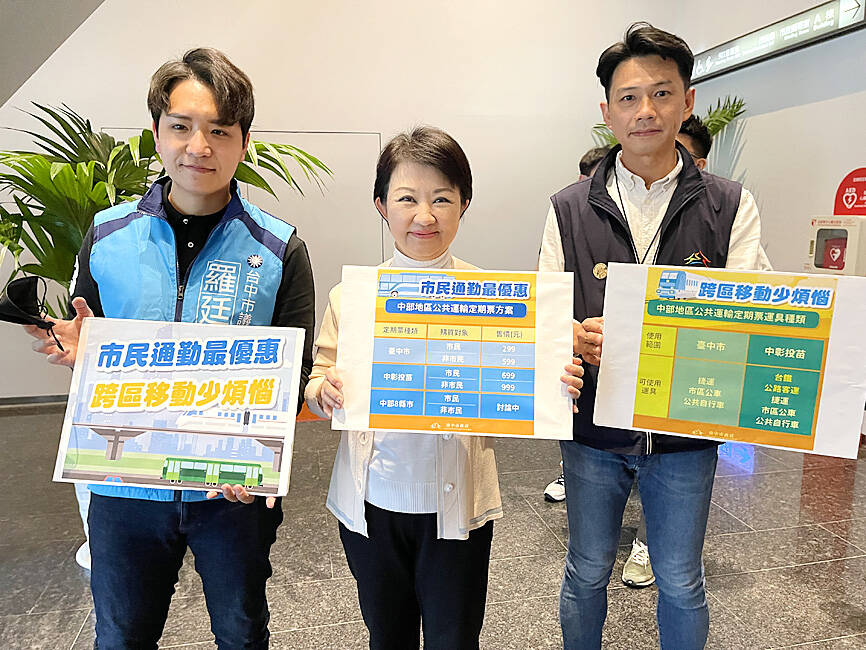Taichung Mayor Lu Shiow- yen (盧秀燕) on Friday announced the city’s plan to offer residents a NT$299 (US$9.75) monthly public transport pass from June as part of a central government project to subsidize public transport.
The pass, which is to cost NT$599 for non-residents, would allow unlimited travel on public transport in Taichung, including city buses, rented bicycles and mass rapid transit (MRT) lines, Lu said.
Also available would be an intercity travel pass, which costs NT$699 for Taichung residents and NT$999 for non-residents, she said.

Photo: Su Meng-chuan, Taipei Times
The intercity travel pass would allow unlimited travel on public transport across Taichung and neighboring Changhua, Nantou and Miaoli counties, covering local city/intercity buses, MRT lines, Taiwan Railways Administration (TRA) trains and bicycle-sharing services.
The Taichung City government said it is also working to expand the area covered by intercity travel services by encouraging the participation of other local governments, such as Hsinchu city and county, Yunlin County and Chiayi City.
The central government project to promote public transport, which includes similar fare subsidies in northern and southern Taiwan, is part of the Cabinet’s disbursement of a NT$380 billion tax surplus last year, but still needs to be approved by the legislature.
The Kaohsiung City Government has said it plans to introduce next month a NT$399 monthly public transport pass for unlimited travel on the Kaohsiung MRT, light rail, city buses, ferries and bicycle-sharing service.
Kaohsiung, Tainan and Pingtung County are also looking to introduce a joint NT$999 monthly pass that would allow unlimited travel between the three destinations via TRA trains and intercity buses.
A NT$1,200 monthly public transport pass serving Taipei, New Taipei City, Taoyuan and Keelung is also likely to be introduced in July, providing unlimited travel on the Taipei and Taoyuan MRT, city buses, bicycles and TRA.

Beijing could eventually see a full amphibious invasion of Taiwan as the only "prudent" way to bring about unification, the US Department of Defense said in a newly released annual report to Congress. The Pentagon's "Annual Report to Congress: Military and Security Developments Involving the People's Republic of China 2025," was in many ways similar to last year’s report but reorganized the analysis of the options China has to take over Taiwan. Generally, according to the report, Chinese leaders view the People's Liberation Army's (PLA) capabilities for a Taiwan campaign as improving, but they remain uncertain about its readiness to successfully seize

Taiwan is getting a day off on Christmas for the first time in 25 years. The change comes after opposition parties passed a law earlier this year to add or restore five public holidays, including Constitution Day, which falls on today, Dec. 25. The day marks the 1947 adoption of the constitution of the Republic of China, as the government in Taipei is formally known. Back then the Chinese Nationalist Party (KMT) governed China from Nanjing. When the KMT, now an opposition party in Taiwan, passed the legislation on holidays, it said that they would help “commemorate the history of national development.” That

Taiwan has overtaken South Korea this year in per capita income for the first time in 23 years, IMF data showed. Per capita income is a nation’s GDP divided by the total population, used to compare average wealth levels across countries. Taiwan also beat Japan this year on per capita income, after surpassing it for the first time last year, US magazine Newsweek reported yesterday. Across Asia, Taiwan ranked fourth for per capita income at US$37,827 this year due to sustained economic growth, the report said. In the top three spots were Singapore, Macau and Hong Kong, it said. South

HORROR STORIES: One victim recounted not realizing they had been stabbed and seeing people bleeding, while another recalled breaking down in tears after fleeing A man on Friday died after he tried to fight the knife-wielding suspect who went on a stabbing spree near two of Taipei’s busiest metro stations, Taipei Mayor Chiang Wan-an (蔣萬安) said. The 57-year-old man, identified by his family name, Yu (余), encountered the suspect at Exit M7 of Taipei Main Station and immediately tried to stop him, but was fatally wounded and later died, Chiang said, calling the incident “heartbreaking.” Yu’s family would receive at least NT$5 million (US$158,584) in compensation through the Taipei Rapid Transit Corp’s (TRTC) insurance coverage, he said after convening an emergency security response meeting yesterday morning. National